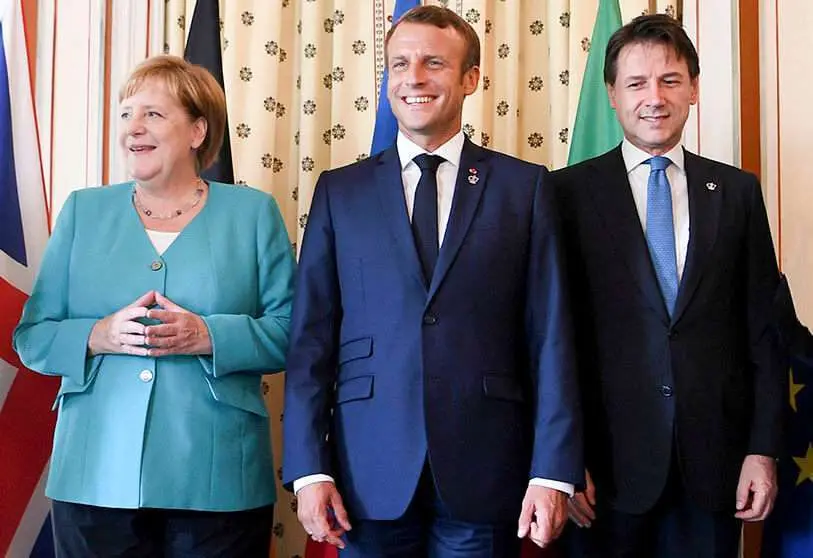Germany, France and Italy urge suspension of military escalation in Libya

In a joint statement by the spokespersons for the German Federal Foreign Office, the French Ministry for Europe and Foreign Affairs and the Italian Ministry for Foreign Affairs and International Cooperation, the three countries call on "all Libyan parties to immediately and unconditionally cease fighting and suspend the military escalation under way throughout the country". In the note, the EU states also call on "all foreign actors to cease all interference and to fully respect the arms embargo established by the UN Security Council and to encourage the rapid conclusion of negotiations within the 5+5 military working group under the auspices of UNSMIL (United Nations Support Mission in Libya) to enable the signing of a sustainable and credible ceasefire agreement".
"This is an essential element in creating the necessary climate for the concrete resumption of the inter-Libyan political dialogue that will allow for a sustainable resolution of the conflict. All efforts in this regard, including the Egyptian initiative announced on 6 June, should be encouraged. Any initiative in support of a ceasefire agreement and a negotiated political solution to the Libyan crisis must be fully inclusive and firmly anchored in the architecture of the Berlin Process, which remains the only viable framework," the communiqué concludes.
Libya has been embroiled in a civil war since 2011 after the fall of Muammar Gaddafi. Since then, two sides have been fighting for power: the Government of National Unity (GNA), led by Prime Minister Fayez al-Sarraj and sponsored by the UN; and the National Liberation Army (LNA), commanded by Marshal Khalifa Haftar. The conflict has been internationalized with the intervention of foreign powers, which support different sides: while Turkey, Qatar and Italy have sided with the GNA, France, Egypt, the United Arab Emirates and the Arab world in general have opted for the LNA.

Therefore, this joint statement from the Ministries of Berlin, Paris and Rome is a significant step towards a unified European position in the Libyan conflict, which had been broken up by France and Italy being on different sides. Although it has not been specified that the two countries will abandon their support for the different factions - especially when Rome has already signed agreements with the GNA, such as the reconstruction of Maitiga/Mitika Airport, a project valued at almost 80 million euros granted to an Italian consortium - it seems that they have managed to reach a common point of view: to promote all the possible road maps to achieve peace in Libya, both the one proposed by the UN, to which Rome is more favourable; and the one presented by Egypt, to which Paris has given its approval, as both contemplate the cessation of hostilities and the end of foreign interference in the war, which is what the European Union has defended from the beginning.
Similarly, with the note, the three countries seem to be implicitly calling on Turkey to stop violating the arms embargo imposed on the North African country in 2011. Since the conflict intensified in April last year, Ankara has been the scene of numerous episodes of arms and mercenaries being handed over to the ranks of the GNA in order to increase the chances of victory for this faction, as happened at the beginning of June when they managed to win the battle over the capital, Tripoli, which had been besieged by the LNA forces for 14 months. According to the Syrian Observatory for Human Rights (SOHR), the Eurasian nation has deployed more than 15,000 Syrian militiamen in Libya, including some 300 minors. In addition, another 1,800 are currently in training camps in Turkey receiving instructions prior to their transfer to the North African country.
It should be recalled at this point that in the last week France has strongly criticized Turkish interventionism, opening a deep breach within the North Atlantic Treaty Organization (NATO), since both are allies of the Atlantic Alliance. Paris considers Ankara's attitude in Libya "unacceptable" and "intolerable", while Ankara accuses Paris of "wanting to divide the country" with the aim of "returning to old colonial times".

Facing this scenario, French Foreign Minister Jean-Yves Le Drian has called on the EU to "quickly open a comprehensive discussion, without taboos and naivety, on the prospects of its future relationship with Ankara", warning of the danger of Turkey's possible accession to the EU axis, something that the Eurasian nation has been requesting for more than half a century. "The EU must firmly defend its own interests because it has the means," stressed the head of French diplomacy.
"The Franco-Turkish systemic rivalry shows no signs of diminishing and has become a significant factor in the volatility of several critical points in the Mediterranean region," warned Professor Michael Tanchum in The Turkey Analyst. On the prospects of a détente in the short, medium and long term, the analyst is not optimistic and reveals the very delicate role that France will play on the board. "With Turkey's effective demonstration of its expeditionary capabilities in Libya, which has already increased Ankara's influence in Tunisia and Algeria [French spheres of influence], a permanent Turkish military presence in Libya [Ankara is negotiating the construction of two bases, one air and one naval, in the country] will consolidate Turkey's status as a major power in North Africa, as well as allowing it to improve its diplomatic and economic reach in the Sahel. Facing this prospect, France may opt to support the establishment of a protectorate administered by Russia and Egypt in eastern Libya in the hopes of limiting Turkey [its ambitions], further fracturing relations between the two NATO allies," the analyst concludes.









